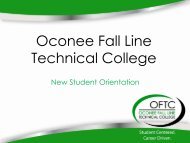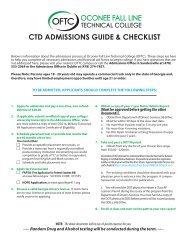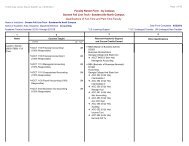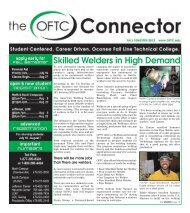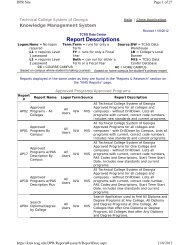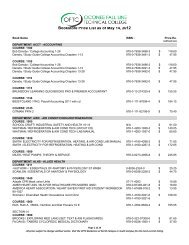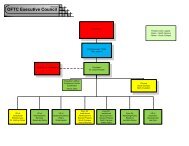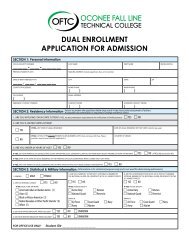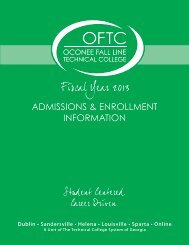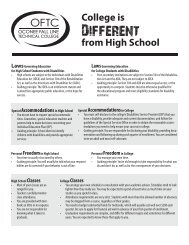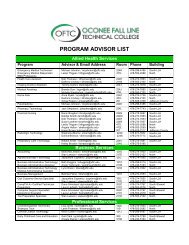OFTC - FY13 Handbook A Unit of the Technical College ... - OFTC.edu
OFTC - FY13 Handbook A Unit of the Technical College ... - OFTC.edu
OFTC - FY13 Handbook A Unit of the Technical College ... - OFTC.edu
You also want an ePaper? Increase the reach of your titles
YUMPU automatically turns print PDFs into web optimized ePapers that Google loves.
- 76 - <strong>OFTC</strong> - <strong>FY13</strong> <strong>Handbook</strong><br />
Definitions<br />
End-user: Any person using <strong>OFTC</strong>’s information systems and/or<br />
computers<br />
REMOTE ACCESS POLICY<br />
Purpose<br />
The purpose <strong>of</strong> this policy is to define standards for connecting<br />
to <strong>OFTC</strong>’s network from any host. These standards are designed<br />
to minimize <strong>the</strong> potential exposure to <strong>OFTC</strong> from damages<br />
which may result from unauthorized use <strong>of</strong> <strong>OFTC</strong> resources.<br />
Damages include <strong>the</strong> loss <strong>of</strong> sensitive or company confidential<br />
data, intellectual property, damage to public image, damage<br />
to critical <strong>OFTC</strong> internal systems, etc. These guidelines are<br />
intended to supplement, not replace, all existing laws, regulations,<br />
agreements, and contracts which currently apply to <strong>the</strong>se<br />
services.<br />
This policy applies to all <strong>OFTC</strong> employees, students, contractors,<br />
vendors and agents with a <strong>OFTC</strong>-owned or personally-owned<br />
computer or workstation used to connect to <strong>the</strong> <strong>OFTC</strong> network.<br />
This policy applies to remote access connections used to do work<br />
on behalf <strong>of</strong> <strong>OFTC</strong> or for <strong>OFTC</strong> academic courses, including<br />
reading or sending email and viewing Intranet web resources.<br />
Remote access implementations that are covered by this policy<br />
include, but are not limited to, dial-in modems, frame relay, ISDN,<br />
DSL, VPN, SSH, cable modems, Remote Lab Access (RLA),<br />
Information Delivery System (IDS), XenDesktop, etc.<br />
General Policy<br />
1. It is <strong>the</strong> responsibility <strong>of</strong> <strong>OFTC</strong> employees, students,<br />
contractors, vendors and agents with remote access<br />
privileges to <strong>OFTC</strong>’s multi-campus network to ensure<br />
that <strong>the</strong>ir remote access connection is given <strong>the</strong> same<br />
consideration as <strong>the</strong> user’s on-site connection to <strong>OFTC</strong>.<br />
2. General access to <strong>the</strong> Internet for recreational use by<br />
immediate household members through <strong>the</strong> <strong>OFTC</strong> Network<br />
on personal computers is not permitted.<br />
3. Please review <strong>the</strong> following policies for details <strong>of</strong> protecting<br />
information when accessing <strong>the</strong> multi-campus network via<br />
remote access methods, and acceptable use <strong>of</strong> <strong>OFTC</strong>’s<br />
network:<br />
a. Computer Use Policy<br />
b. E-mail Use Policy<br />
c. Privacy Notice to Computer Users<br />
4. For additional information regarding <strong>OFTC</strong>’s remote access<br />
connection options, including how to request service<br />
and obtain technical support, contact <strong>OFTC</strong> Information<br />
Technology Department located on North or South campus.<br />
Requirements<br />
1. At no time should any <strong>OFTC</strong> employee, student, contractor,<br />
vendor or agent with remote access privileges provide <strong>the</strong>ir<br />
login or email password to anyone, not even family members.<br />
2. Reconfiguration <strong>of</strong> a home user’s equipment for <strong>the</strong> purpose<br />
<strong>of</strong> split-tunneling or dual homing is not permitted at any time.<br />
3. Frame Relay must meet minimum au<strong>the</strong>ntication<br />
requirements <strong>of</strong> DLCI standards.<br />
4. Non-standard hardware configurations must be approved<br />
by <strong>the</strong> Information Technology Department, and <strong>the</strong> IT<br />
Department must approve security configurations for access<br />
to hardware.<br />
5. All hosts that are connected to <strong>OFTC</strong> internal networks via<br />
remote access technologies must use up-to-date anti-virus<br />
s<strong>of</strong>tware.<br />
6. Organizations or individuals who wish to implement nonstandard<br />
Remote Access solutions to <strong>the</strong> <strong>OFTC</strong> production<br />
network must obtain prior approval from <strong>the</strong> Director <strong>of</strong><br />
Information Technology.<br />
Enforcement<br />
Abuse or misuse <strong>of</strong> computing/information technology services<br />
may violate this policy, but it may also violate criminal statutes.<br />
Therefore, <strong>OFTC</strong> will take appropriate action in response to user<br />
abuse or misuse <strong>of</strong> computing/information technology services.<br />
Action may include, but not necessarily limited to, <strong>the</strong> following:<br />
1. Suspension or revocation <strong>of</strong> computing privileges. Access<br />
to all computing facilities and systems can, may, or will be,<br />
denied;<br />
2. Reimbursement to <strong>OFTC</strong> for resources consumed;<br />
3. O<strong>the</strong>r legal action including action to recover damages;<br />
4. Referral to law enforcement authorities;<br />
5. Computer users (faculty, staff and/or students) will be<br />
referred to <strong>the</strong> appropriate <strong>of</strong>fice for disciplinary action.<br />
Definitions<br />
Cable Modem: Cable companies such as AT&T Broadband<br />
provide Internet access over Cable TV coaxial cable. A cable<br />
modem accepts this coaxial cable and can receive data from<br />
<strong>the</strong> Internet at over 1.5 Mbps. Cable is currently available only in<br />
certain communities.<br />
CHAP: Challenge Handshake Au<strong>the</strong>ntication Protocol is an<br />
au<strong>the</strong>ntication method that uses a one-way hashing function.<br />
DLCIData Link Connection Identifier ( DLCI) is a unique number<br />
assigned to a Permanent Virtual Circuit (PVC) end point in a<br />
frame relay network. DLCI identifies a particular PVC endpoint<br />
within a user’s access channel in a frame relay network, and has<br />
local significance only to that channel.



